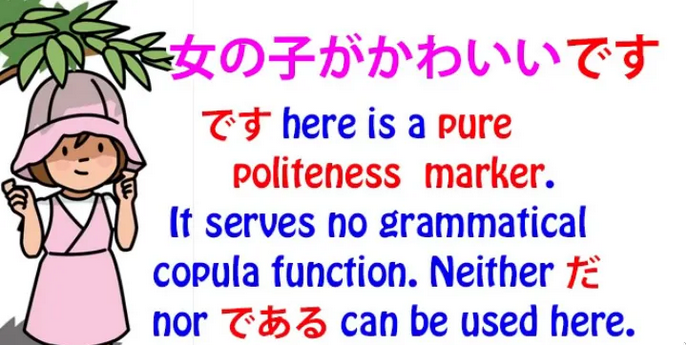Tất cả đống dưới này đều là copula (Hay hệ từ). The simplest way of defining a copula is that it is a one way equals sign. Now, that is the simple explanation. But if we go a little deeper, what the copula actually does is place things in sets. さくらは日本人**です** means that Sakura belongs to the set Japanese person.
だ、です
And as we know, what the copula does is tell us that A is B. さくらが日本人**だ** means Sakura **is** a Japanese person. It only works one way around. A Japanese person is not necessarily Sakura. Sakura is a Japanese person. That's what we're being told by a copula sentence.
Khi thử tra từ điển cho です thì nghĩa của nó là「である」「だ」の丁寧表現で、相手に対して改まった気持ちを表す。(Có một số trường hợp hiếm hoi nó dùng khác, kiểu như trong tính từ thì nó là polite marker, hoặc trong một số trường hợp khác....). There's one case where です is used where it doesn't function as a copula, and that is the case of adjectives. です doesn't get dropped because it's formal speech. In the first place, we drop less in formal speech. Còn về だ thì kiểu nếu biết "3 kiểu câu" trong Tiếng Nhật thì bạn có thể bỏ だ!!?
(Cần phân biệt giữa copula với state-of-being trong Tiếng Nhật) If we believe that the Japanese copula, which is expressed by だ or です, and the state of being, which is expressed by いる or ある, are in fact the same, we've simply lost a fundamentally important distinction in Japanese.
である copula form
It's an old form of the copula and it's used in formal but not necessarily polite contexts. So it can be used for example in newspaper reporting where it's just being formal and objective, not particularly polite.
The famous novel I Am a Cat is, in Japanese, 我輩は猫である, and the reason it uses 我輩 for I and である for the copula conveys in Japanese, in a way that the English translation can't convey, the character of the cat in question, who has the personality of a rather 偉そう, a rather self-important gentleman who refers to himself as 我輩 and uses the rather archaic and formal but not particularly polite copula である.
でございます
でございます, and that's ultra-polite. It's 敬語, and you'll have this used to you in Japanese hotels and places like that.
Một số lưu ý về です
And a thing that です does in this case is that it can be added to adjectives. So we say 女の子がかわいい**です**.
 Now, this
Now, this です is not acting as a copula. It's simply a formality marker. The other, non-polite forms of the copula, だ and である, are not put onto the end of adjectives.